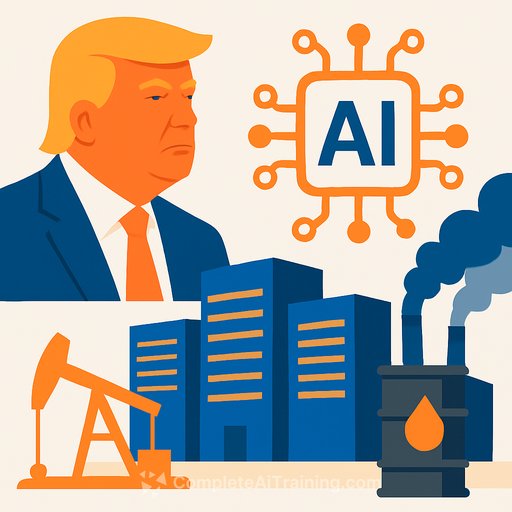Trump Administration’s AI Plan Eases Environmental Regulations for Data Centers
The Trump administration recently unveiled an AI action plan aimed at accelerating the development of artificial intelligence infrastructure in the U.S. Central to this plan is a significant reduction in federal oversight, including waiving certain environmental rules for data centers.
This approach, dubbed “Build, Baby, Build!”, prioritizes rapid AI infrastructure growth, potentially at the expense of environmental safeguards. The plan explicitly supports expanding data centers and related power plants with minimal regulatory hurdles, raising concerns about increased fossil fuel use and environmental impacts.
Big Tech’s Role and Policy Influence
Leaders from major tech companies like Meta, Amazon, and Google have played a visible role in supporting the administration’s AI agenda. Their influence is clear in the policy recommendations adopted, such as expedited permitting processes and relaxed environmental standards.
The Data Center Coalition, an industry lobbying group including many tech giants, advocated for measures like federal land access for data center construction, onsite cogeneration (burning fossil fuels to power data centers), and streamlining water and environmental permits. Many of these suggestions are reflected in the administration’s plan.
Environmental and Community Concerns
The plan’s loosening of regulations has sparked alarm among environmental advocates, especially in regions already facing pollution challenges. For example, in South Memphis, residents have raised concerns about unpermitted operation of gas turbines by an AI company, which emit harmful pollutants near predominantly Black communities.
Organizations like the Southern Environmental Law Center (SELC) warn that unchecked data center expansion will increase reliance on fossil fuels and intensify environmental injustice. They emphasize the need for transparency and community engagement before new infrastructure projects proceed.
Key Regulatory Changes Proposed
- Waiving public notification requirements under the Clean Water Act for data center construction, limiting community input on local water impacts.
- Opening federal lands for data center and power plant development to facilitate rapid deployment.
- Establishing exclusions for data centers under the National Environmental Policy Act (NEPA), reducing environmental impact assessments.
- Revising AI development guidelines to remove references to misinformation, climate change, and diversity considerations, under the banner of protecting free speech.
These changes come amid broader efforts by the administration to weaken environmental review processes, including modifying NEPA to limit public participation and transparency on new projects.
Industry and Government Endorsement
Federal agencies like the Department of Labor have praised the plan, highlighting its potential to boost economic growth and create jobs. Meanwhile, the Pentagon has awarded AI contracts to key industry players, including Google, OpenAI, Anthropic, and xAI, underscoring the strategic importance of AI development.
Notably, Elon Musk has been a prominent figure in the administration’s AI initiatives, previously serving as an adviser and securing multiple federal contracts for his AI ventures.
What IT and Development Professionals Should Know
The administration’s push to accelerate AI infrastructure with relaxed regulations may lead to rapidly expanding data center capacity, often powered by fossil fuels. This has implications for energy demand, grid stability, and environmental sustainability.
Professionals working in AI development, cloud infrastructure, or data center operations should be aware of these regulatory shifts as they influence project timelines, compliance requirements, and community relations.
Staying informed about these policy changes can help teams anticipate potential challenges around permitting and environmental impact assessments. For AI developers seeking to deepen their understanding of AI infrastructure and operations, exploring relevant training can provide practical insights. Resources like Complete AI Training’s latest courses offer up-to-date education on AI technologies and industry trends.
Looking Ahead
The Trump administration’s AI action plan signals a clear preference for rapid industry growth with limited regulatory interference. While this may speed up AI deployment, it raises critical questions about environmental responsibility and community impact.
Those involved in AI and data center projects should carefully balance the demands of scaling infrastructure with sustainable practices and transparent stakeholder engagement.
Your membership also unlocks:






